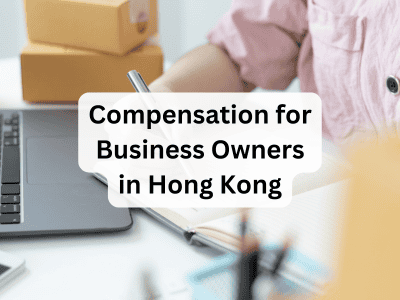This post is also available in:
![]() 繁體中文 (Chinese (Traditional))
繁體中文 (Chinese (Traditional)) ![]() 简体中文 (Chinese (Simplified))
简体中文 (Chinese (Simplified))
Compensation for Business Owners in Hong Kong: Director Fees, Dividends, and Salaries

As a business owner in Hong Kong, one of the most critical financial decisions you will make is how to compensate yourself. Whether you choose to pay yourself through a salary, director’s fees, dividends, or loans, each option has distinct implications for your taxes, the company’s finances, and your long-term financial strategy. A well-structured approach can optimize tax efficiency for both you and your company, ensuring compliance and financial sustainability. This guide explores the various compensation options available to business owners in Hong Kong to help you make informed decisions.
Understanding Your Compensation Options
As a business owner, you have several ways to compensate yourself, each with its own benefits and considerations:
1. Salary
A salary is a common method of compensation for business owners in Hong Kong. Here’s what to consider:
- Mandatory Provident Fund (MPF) Contributions: Salaries are subject to MPF contributions, with both employer and employee contributing 5% of the monthly salary (capped at HKD 1,500 each per month). While this increases costs for the company, MPF contributions provide long-term retirement benefits.
- Taxation: Salaries are considered personal income and are subject to salaries tax in Hong Kong, which is capped at a standard rate of 15% or progressive rates up to 17%.
- Flexibility: Salaries can be adjusted, and bonuses can be included to manage personal and business cash flow.
2. Director’s Fees
For business owners who also serve as directors, director’s fees are another compensation option:
- No MPF Requirement: Director’s fees are not subject to MPF contributions, reducing administrative costs.
- Taxation: Director’s fees are taxed as personal income at the same rates as salaries.
- Formalities: Declaring director’s fees requires formal board resolutions and may involve additional administrative steps.
3. Dividends
Dividends are a popular method of compensation for business owners, especially for profitable companies. Key considerations include:
- Tax-Free for Shareholders: Dividends are not subject to personal taxation in Hong Kong, making them an attractive option for extracting profits.
- Corporate Taxation: Dividends are paid out of after-tax profits, which means the company must first pay the corporate profits tax (capped at 16.5% or 8.25% for the first HKD 2 million of profits under the two-tiered tax system).
- Profit Requirement: The company must have sufficient retained earnings to declare dividends.
- Formalities: Declaring dividends requires board resolutions and may involve corporate secretary fees.
4. Loans/Advances
Some business owners choose to take loans or advances from their companies. While this provides immediate liquidity, it comes with certain implications:
- Tax Implications: Loans taken in the capacity of a director or shareholder may be deemed as income if not properly structured and documented.
- Repayment Obligation: Loans must be repaid to the company. Using dividends or other forms of compensation to settle loans is common if retained earnings are sufficient.
Key Considerations When Deciding on Compensation
When deciding how to compensate yourself, consider the following factors:
- Corporate Tax Rates: Hong Kong’s corporate tax rates are competitive, with a two-tiered system offering reduced rates on the first HKD 2 million of profits.
- Personal Tax Rates: Salaries and director’s fees are taxed at progressive rates, but dividends remain tax-free at the personal level.
- Profitability: Dividends depend on the company’s profitability, while salaries and director’s fees can be paid regardless of retained earnings.
- Future Cash Needs: Dividends allow for flexible cash withdrawals, but require sufficient retained profits.
Illustrative Example: Comparing Compensation Options
Let’s consider an example of a company with HKD 2,360,000 in profits:
- Without Salary or Director’s Fee: The company pays HKD 224,400 in corporate tax (under the two-tiered system).
- With HKD 360,000 Salary or Director’s Fee: The company pays HKD 165,000 in corporate tax, and you pay HKD 20,760 in personal tax (taking into account basic allowance HKD 132,000), resulting in a total tax payment of HKD 185,760. This results in tax savings of HKD 38,640.
This example excludes other personal income and reliefs. Actual savings depend on individual circumstances.
Conclusion
Compensating yourself as a business owner in Hong Kong requires a strategic balance of personal and corporate tax considerations. Whether you choose a salary, director’s fee, dividends, or loans, each option has unique advantages and challenges. By understanding the implications of each compensation method, you can make informed decisions that optimize tax savings and support your business’s financial health.
If you need assistance navigating these options and optimizing your compensation strategy, please feel free to contact us.

